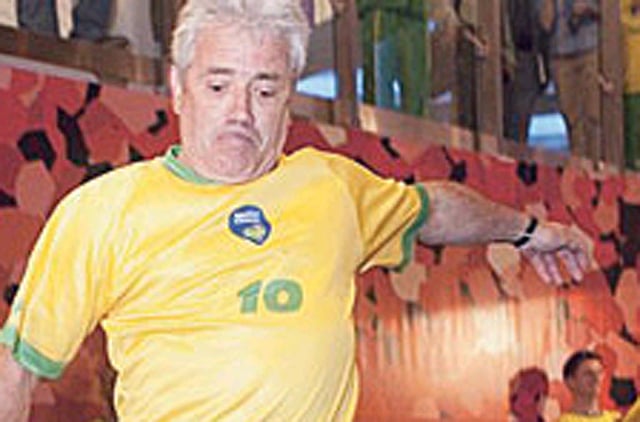London: Kevin Keegan once got a lovely fax. It came from the most powerful and, in some quarters today, detested man in football. "Please allow me on behalf of Fifa, and all those who believe in the spirit of fair play, to commend you for the positive attitude you bring to our game," wrote Sepp Blatter.
This was all the more surprising since it came after Keegan saw his Newcastle United team's season crash and burn. On April 3, 1996, Newcastle lost 4-3 at Liverpool in one of the more thrilling games played in the English premiership. The lead changed four times, Newcastle were ahead 3-2 with 22 minutes to go, but were confounded by a 90th minute Stan Collymore coup de grace.
That drama was personified by Keegan never a man, as player or manager, to repress his feelings slumped over Anfield's advertising hoardings after defeat. "Kevin Keegan hangs his head," howled one commentator. "He's devastated!" Keegan was in fact unrepentant. "We'll carry on playing this way, or I go," he told reporters later.
I remind Keegan of Blatter's fax for two reasons. One, because it recalls distant days when the Fifa general secretary praised English footballing philosophy, rather than being the man widely regarded as heading a corrupt organisation that scuppered England's chance of hosting the 2018 World Cup. And two, to remind us that Keegan's derided gung-ho tactics have had eminent supporters.
"I remember that fax very well," says Keegan. "Blatter was pleased the game was great spectacle, not tactically clever stalemate."
But it wasn't just the spectacle that impressed Blatter. It was Keegan's heroic scorn for disaster. "I remember saying: ‘I should be despondent but I am not.' For me, then and now, the question is, ‘What is success?' It isn't only about winning, but playing in a certain way."
Morally bankrupt
We're in room 2812 of a labyrinthine Manchester airport transit hotel, 10 minutes from Keegan's home. We're sitting in two narrow tub chairs, one of which can scarcely contain the still firm musculature of the 60-year-old, 5ft 8in footballing superstar, whom adoring Hamburg fans nicknamed, in his late-70s pomp, "Mighty Mouse".
It's an interesting week to meet Keegan, as Fifa's reputation plunges into freefall. On June 20, vice-president Jack Warner resigned amid suggestions that he jumped before he was pushed; later, a leaked report from Fifa's ethics committee alleged Warner had been told it was likely he was at least "an accessory to corruption". When I solicit Keegan's thoughts on it, he sounds an intriguingly sceptical note.
"What I know is that when I was England manager I went to Trinidad and Tobago, where Jack Warner was king of football, and he had clearly done a lot of good in providing training facilities and getting kids into the game. How he had got the money to do that I don't know."
"What amazes me more than anything is that Jack Warner leaves and they drop all the charges against him. Only football organisations like Fifa and the FA could get away with that. Any other organisation would face a thorough going investigation from the outside."
Surely the FA isn't similar to Fifa? "To a certain degree the FA is very similar. Only a few votes decide who's on a committee, and a handful of top guys make the huge decisions that make or break the game. The person at the top defines the morals of an organisation, often not for the good. You see that at football clubs all the time."
So what's the answer to such plutocratically run football clubs divorced from their social roots and historic fan bases? "In Barcelona they have 146,000 owners, and the best football team in the world. It's been tried in England by putting supporters on the board, but not enough."
Reforms
That reform alone would not solve one of English (not to mention Scottish, Welsh and Irish) football's biggest problems the dearth of great home-grown talent in allegedly the world's greatest club league. "English football is in a bad way because the foreign players here are so good, so dominant," says Keegan. So do you feel sympathy for Fabio Capello, England's current manager? "He knows what I know that there are a few players coming through who are good. Thankfully that's not my problem now."
After England's spiritless World Cup collapse this time last year, and the mediocrities of the 2010-11 premiership season, perhaps it could do with Keegan's "positive attitude", and his return to football management.
"I still get offers, but I don't fancy it." Instead he's just renewed his two-year contract as a pundit for sports network ESPN.
Keegan retired from playing aged 33 and moved to Spain, where his two daughters (no sons to follow in his footballing footsteps) grew up unaware he was a footballer. He played a lot of golf in those days. "They may have thought I was a professional golfer."
Was moving into management with Newcastle in 1992, then Fulham, England, Manchester City and Newcastle again any sort of compensation? "After playing football, there's nothing like it again. Management is a pale attempt to hang on to the excitement."
His wife Jean phones demanding he returns home to look after the dog. And so ends my hotel room tryst with a legend.
Sign up for the Daily Briefing
Get the latest news and updates straight to your inbox
Network Links
GN StoreDownload our app
© Al Nisr Publishing LLC 2025. All rights reserved.
